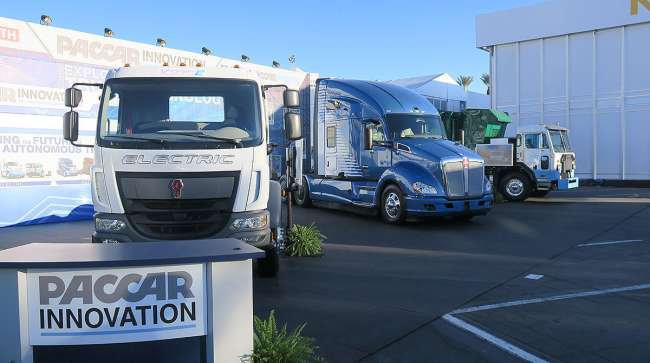Staff Reporter
Paccar Q1 Profit Rises, Earnings Top Expectations

[Stay on top of transportation news: Get TTNews in your inbox.]
Profits at Paccar Inc. surged 63.5% in the first quarter of 2024, outstripping analysts’ expectations.
The Bellevue, Wash.-based parent company of U.S. Class 8 truck brands Kenworth Truck Co. and Peterbilt Motors Co. posted net income of $1.20 billion, or $2.27 per diluted share, up 63.5% from $733.9 million, $1.40, a year earlier. However, the Q1 2023 result included a one-time $446.4 million charge related to civil litigation in Europe and Paccar’s DAF subsidiary. With that charge stripped out, the truck maker would have posted a $1.18 billion profit in the year-ago period.
Paccar’s Q1 revenue totaled $8.74 billion, up 3.19% compared with $8.47 billion in 2023.
“Paccar reported excellent revenues and net income in the first quarter of 2024,” CEO Preston Feight said in a statement accompanying the April 30 earnings release. “Paccar’s results reflect ongoing demand for premium quality DAF, Peterbilt and Kenworth trucks, aftermarket parts and financial services.” Feight said during the company’s April 30 earnings call that Paccar “demonstrated we can perform though all parts of the business cycle.”
Paccar’s Q1 results topped consensus Wall Street expectations. According to Zacks Equity Research, analysts expected the company to post EPS of $2.17 on revenue of $8.08 billion.
The company’s truck manufacturing division reported a nearly 2% increase in Q1 revenue to $6.541 billion from $6.413 billion a year earlier. Paccar’s Q1 truck deliveries in the U.S. and Canada increased 13.46% year-over-year to 29,500 from 26,000. Kenworth and Peterbilt won a combined Class 8 market share of 30.3% in the first quarter of 2024, compared with 29.5% in the year-ago period, Paccar said.
Globally, the company’s truck deliveries in Q1 fell 5.87% to 48,100 from 51,100 a year earlier.
During the analyst call, CFO Harrie Schippers said global sales were expected to total 48,000 vehicles in the second quarter of 2024.
Feight said strong vocational sector demand was driving Kenworth and Peterbilt sales, noting that while buyer appetite in the less-than-truckload segment is healthy, it’s being offset by weaker demand in the truckload sector. Truckload players want to keep buying trucks, but also want to know when the freight sector is going to turn, he said.
On that front, he noted positive signs including healthy infrastructure spending and gross domestic product that’s expected to increase 2.4%. He added that unemployment numbers are falling and said interest rates are not punitive if viewed from a historical perspective.
That said, Paccar has trimmed its U.S. and Canadian Class 8 truck retail sales expectations. The latest forecast is for retail sales in a range of 250,000-290,000 trucks in 2024, compared with a prediction of 260,000-300,000 trucks three months ago.
Check out Transport Topics' updated Top 100 list of the largest logistics companies in North America, and explore how the industry's top players have adapted to a tough freight market and are preparing for the future. Tune in above or by going to RoadSigns.ttnews.com.
Paccar truck prices rose 3% year-over-year in Q1, Chief Accounting Officer Brice Poplawski said during the call, adding that costs rose by a similar amount. Feight said prices at Paccar Parts also rose 3% in Q1, but costs only rose 2%.
Paccar Parts Q1 revenues totaled a record $1.68 billion, compared with $1.62 billion in the same period a year earlier.
That total missed Zacks’ expectations by the smallest of margins. Analysts at Zacks expected the parts unit to report $1.69 billion in revenue on the back of what the group said was “rampant adoption” of Paccar’s MX-11 and MX-13 engines.
Paccar posted a 19% margin in the most recent quarter, although that is expected to slip to 18%-18.5% in the second quarter, Schippers said.
“Paccar’s long-term investments in new truck models, advanced manufacturing and technology-enabled aftermarket solutions are contributing to Paccar’s strong operating margins,” Feight said. Paccar’s Q2 order book is filling up while the Q3 order book is starting to fill in, said Feight. Paccar’s vocational truck order book is booked up through the end of 2024, he added, noting that Paccar trucks are stacked up at body builders.
Feight also said Paccar expects an increase in sales across the board in 2025 and 2026 from carriers seeking to front-run the introduction of tougher emissions regulations from the U.S. Environmental Protection Agency in 2027. Meantime, the company is developing next-generation powertrains and connected systems to meet those strictures, Feight said.
During the call, Schippers said Paccar intends to launch California-specific engines later this year to meet the state’s forthcoming emissions standards, which are viewed as a precursor to the 2027 EPA regulations.
🚛🚚 @AcceleraZero, #DaimlerTruck & #PACCAR select Mississippi for Battery Cell Production in the United States. 🔋⚡
The #JointVenture will localize #BatteryCell production for #CommercialVehicles
Press release: https://t.co/XywxBT9636 pic.twitter.com/8yZVMqMNDg — Daimler Truck AG (@DaimlerTruck) January 19, 2024
Paccar also provided new details on a related development, revealing its battery cell manufacturing joint venture expects to begin construction of a proposed 21-gigawatt hour factory in Marshall County, Miss., in the second quarter.
The JV — with Daimler Truck and Accelera by Cummins — expects battery production to start in 2027. Paccar anticipates investing $600 million to $900 million in the JV, it said.
Want more news? Listen to today's daily briefing below or go here for more info:





